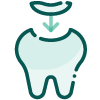Mouthguards are custom-made rubber-like appliances which fit over the teeth and gums to protect them from damage.
Mouthguards

Sports
It is important to wear a professionally made mouthguard whenever you play a sport that involves contact or moving objects (football, hurling, soccer, boxing, rugby, hockey etc.). Most significant dental emergencies can be avoided if you consistently wear headgear such as a helmet in addition to a mouthguard. In addition to protecting your teeth, mouthguards have also shown to prevent damage to the jawand gums.
Let us know if you are in need of a mouthguard can we can have one custom-made for you. They are available in many different colours and are a small price to pay for peace of mind.
Remember, young people who are still growing will need to have their mouthguards replaced more regularly to ensure a proper fit. For adults, mouthguards can be brought in during a regular dental visit so that we can check if it requires replacing as they tend to wear over time.
Grinding and Clenching
Do you wake up with pain in your jaw? Do you suffer from frequent headaches? You may be clenching or grinding your teeth without realising.
For patients who grind or clench their teeth (bruxism), we often recommend a night-time mouthguard. These can help prevent further damage and wear on the teeth as well as alleviate some of the other problems associated with bruxism (headaches, jaw pain etc.). Night-time mouthguards (or splints) are different from the mouthguards that people wear for sport. They are custom-made from a plastic material that fits over the upper or lower teeth and prevent your teeth from touching each other. These mouthguards can also help to hold your jaw in the correct position.
Most people who grind their teeth also suffer from high levels of stress so it is a good idea to speak to a member of our team who may be able to suggests certain relaxation therapies or stress-relief exercises.
Any questions?
We are experienced and sympathetic in dealing with each patient’s anxieties and pride ourselves on developing a personal relationship with our patients.















